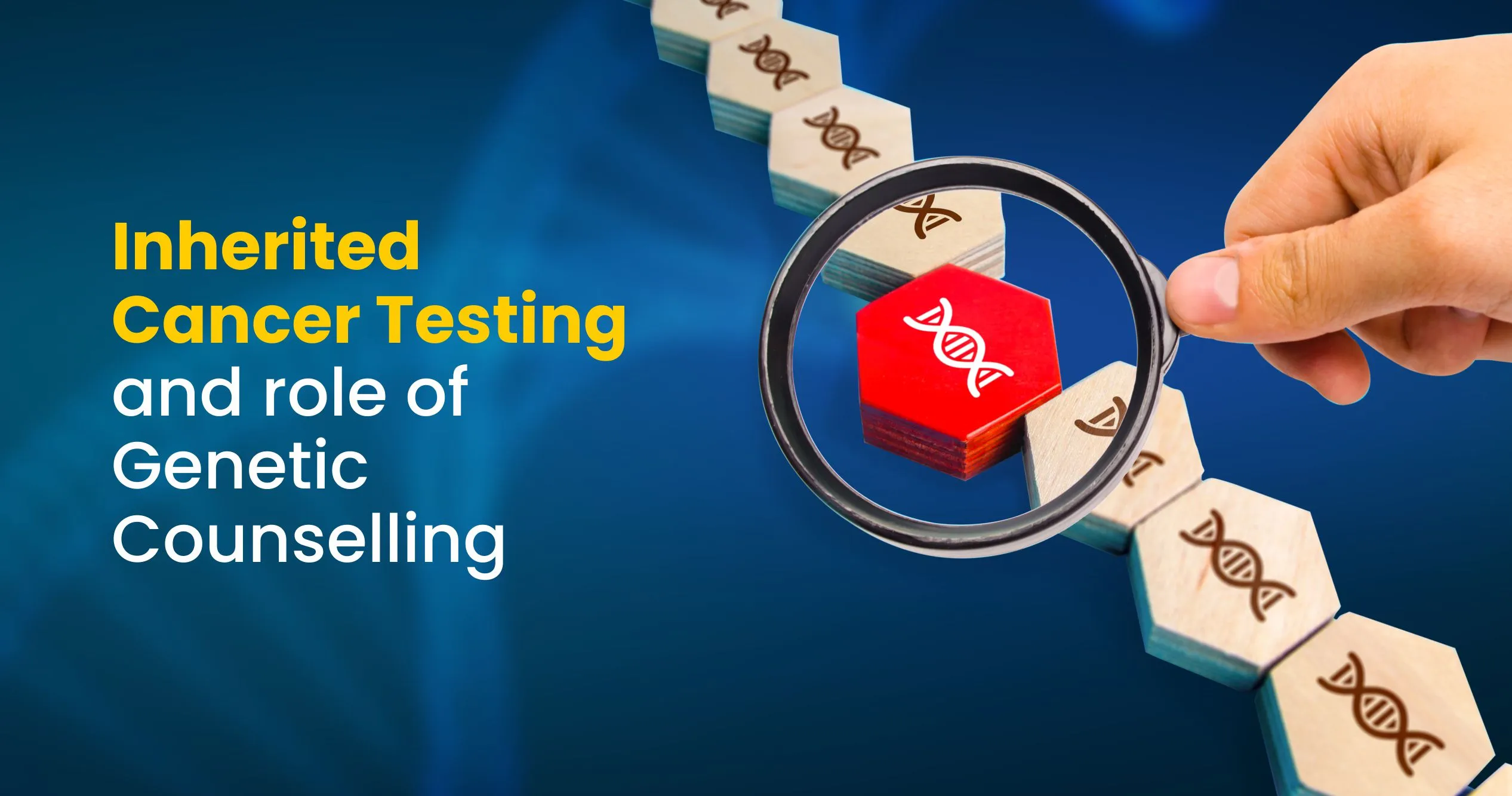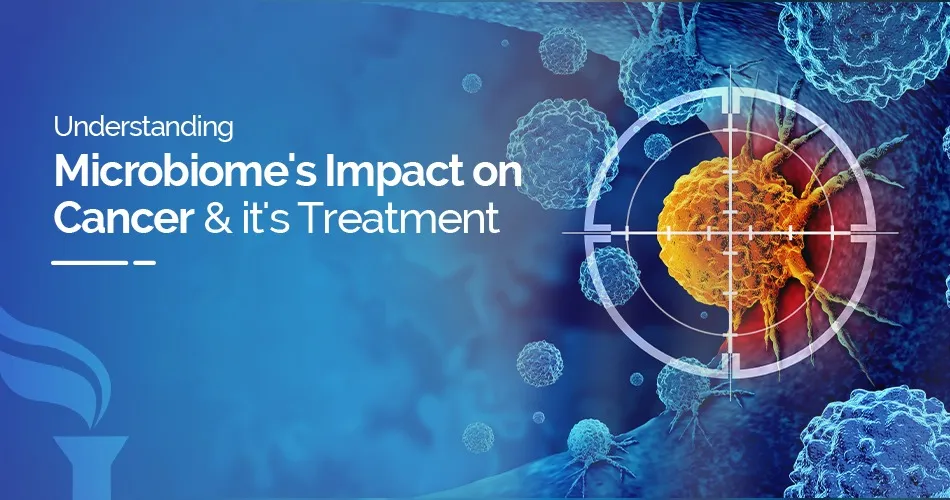Inherited Cancer Testing and Role of Genetic Counselling.
Aug 02, 2023

Cancers have become so common that around 18.1 million cancer cases were reported worldwide in 2020. The rise in cancer patients is due to our addiction to unhealthy eating and lifestyle options. However, apart from other reasons, gene mutation is one of the top causes behind the rising number of cancer patients all around the globe.
Around 5-12% of cancers are caused by genetic mutations or modifications in the DNA. Sometimes, the modified DNA gets transferred to the next generation, with the possibility of developing cancers in the offspring. It is called inherited cancer syndrome, and one of the best ways to detect it is through inherited cancer testing. This article focuses on how genetic counselling can help to understand the entire inherited cancer testing process and navigate through it.
What is Inherited Cancer Testing?
Inherited cancer testing is genetic testing to determine the likelihood or confirm the chances of inheriting cancer. Genetic mutations change how our cells work, especially multiplication and division during cancer. Most mutation happens during the entire lifetime; however, these mutations are likely to be transferred to the offspring, increasing the risk of developing cancer in children.
The impact of genetic testing or inherited cancer testing can have severe psychological, financial, and medical implications. That's why genetic counsellors can help you navigate through the process and determine what's best in your situation. The counsellors will explain the genetic results' impact on your family because if the hereditary mutation is detected in the results, the doctor might ask your other family members to undergo testing.
Can genetic mutation cause cancer?
DNA is a building block for maintaining and building the human structure. It is organized into genes and contains essential information for building proteins that control essential life processes, like cell division and multiplication.
However, cancer can cause mutation. It modifies the instructions needed to make certain proteins and turns healthy cells into cancerous cells. For example, P53 is a gene with an instruction manual for developing tumour protein called 53 or P53, which keeps your cell from dividing and growing too quickly in an uncontrolled way. If there is a mutation in the P53 gene, the manual for generating the P53 protein changes, and it can lead to uncontrolled cell division leading to cancer.
Researchers have found around 400 genes associated with risk cancer like the BRCA gene is associated with an increased risk of development of breast, ovarian, and other types of cancers. However, it is essential to clear that not every cancer is hereditary, like cervical cancer. Here is the list of cancers that can be hereditary:
- Breast
- Ovarian
- Colon
- Uterine
- Pancreatic
- Prostrate
- Stomach
- Thyroid
- Kidney
How does genetic counselling help in inherited cancer testing?
Genetic counselling plays a significant role in genetic testing. A genetic counsellor guides patients or their families in case of genetic disease. Family history includes lifestyle and recreational activities that could raise or lower your risk for a genetic condition. Genetic counsellors also examine the effect of environmental changes on how these conditions develop in the body.
in genetic testing. A genetic counsellor guides patients or their families in case of genetic disease. Family history includes lifestyle and recreational activities that could raise or lower your risk for a genetic condition. Genetic counsellors also examine the effect of environmental changes on how these conditions develop in the body.
In the case of cancer, the genetic counsellor evaluates the family's health history. They execute screening and management for those who are at risk. They also guide the individuals for any required tests that are useful for correcting the disease. Many families are at-risk of developing a genetic condition.
Let's learn more about the function of genetic counselling in testing for inherited cancer.
- Counsellors determine a person's risk of developing cancer based on personal and family medical history.
- They examine the likelihood of having an inherited cancer syndrome and identify the pattern of cancer.
- The therapy ensures the person with this syndrome is fully aware of the advantages and disadvantages of the test.
- People are also informed of the test's emotional and psychological effects on the person.
The counsellors provide information on the specifics of the genetic testing process. Also, they inform about particular genetic mutations. They provide information about the hereditary cancer problem, including information on its associated risks. Genetic counselling addresses the worry that can be brought on by genetic testing.
Who should get genetic counselling for inherited cancer testing?
Here is the list of all people who should get genetic counselling done for cancer testing:
- People who are diagnosed with cancer before 50.
- People are diagnosed with different kinds of cancer.
- People with cancers in both sets of organs, like cancer in both breasts or kidneys.
- Several first-degree family members, like biological parents, siblings, or children, have the same type of cancer.
- Several members of your family are diagnosed with cancer.
- People with physical differences are associated with certain inherited cancer syndromes. Like neurofibromatosis, Type 1 is an inherited cancer that causes noncancerous tumours called neurofibromas.
How do you prepare for your appointment with a genetic counsellor?
A genetic counsellor is one of the best authorities if you want to make sense of your genes or genetic report for inheriting a genetic condition or for recurrent pregnancy loss. During your session with a genetic counsellor, the counsellor will ask questions about your and your family's medical history. Here is how the session with the genetic counsellor can go:
- The counsellor will ask about your cancer experience, like cancer type, which body part was affected, and the age of diagnosis. It is better to carry all the medical records to help the counsellor assess your situation.
- The genetic counsellor might ask you about your family members with cancer history. Try to carry your family members' reports for better assessment if possible.
- The counsellor will ask about the age of the family member's diagnosis because the chances of inheriting cancer increase if the cancer is detected at a young age.
- The counsellor will suggest some tests or cancer screenings if you are at high risk for inherited cancer syndrome. The genetic counsellor will explain everything about the tests, from procedure to cost. Even the expert will help you analyze the results and what appropriate steps can be taken to minimize the complications.
Wrapping up,
The best way to beat cancer is early detection and diagnosis. However, people delay getting a test and decide to believe otherwise worsens the situation. It is essential to stand up against cancer to defeat it, and genetic counselling can help you take the right step.
It is unnecessary that you may have inherited cancer syndrome, so visiting a genetic counsellor is essential before enrolling for genetic testing. Genetic counsellors at Apollo Diagnostics are here to help you plan a chart out if you are lost. Our genetic counsellors will help before and after getting genetic testing, prioritizing your well-being and health. Visit today to schedule your appointment before it's too late to beat the cancer.
Related Blog Post
- 5 Ways to support a loved one with cancer
- Preventing cancer is better than living with cancer.
- Cervical Cancer is a Form of Cancer Which Develops in the Cervix.
- World Breast Cancer Awareness Month
- Do all Breast Cancers run in the family – Are they hereditary?
- Incidence of Cervical Cancers in India – Role of HPV testing & Vaccination
Blog Categories
- Child Health
- Mens Health
- Women's Health
- Mental Health
- Health Myths & Facts
- Fitness
- Nutrition/Recipes
- Remedies
- Weight Management
- Stress Management
- Health Supplements
- Addiction Management
- Disease Management
- Allergy
- Anemia
- Arthritis
- Asthma
- Autoimmune Diseases
- Blood Pressure
- Cancer
- Deficiencies
- Dengue/Malaria/Chikungunya
- Diabetes
- Eye Problems
- Heart Diseases
- Hepatitis
- HIV/AIDS/STD
- Hormonal Imbalance
- Infection/Flu/Viral
- Kidney
- Liver
- Menstrual Problems
- Pregnancy
- Skin & Hair Problems
- Stomach Ailments
- Thyroid
- Others
- Health Checkups
- Diagnostics/Pathology
- Lifestyle & Wellness
- Covid
- Medical Tests
- Cholesterol
- Health Tips
- Parent Care/Old Age
- Lungs
- Food Intolerance








